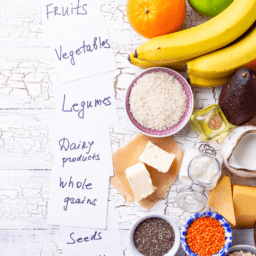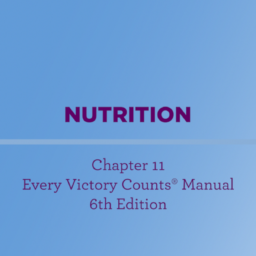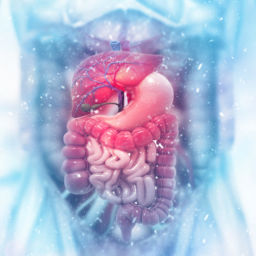In this Live Well Today webinar, Davis Phinney Foundation Executive Director Polly Dawkins talks with Kristin Gustashaw, a registered dietician at Rush University Medical Center, about nutrition and Parkinson’s. They discuss general dietary guidance for people with Parkinson’s; alcohol, dairy, and fiber; and a new perspective on protein-levodopa interactions.
An audio version of this webinar is available.
NOTES
Many people with Parkinson’s notice that what they eat and drink impacts their symptoms. This is understandable: There are multiple associations between nutrition, metabolism, and Parkinson’s.
For example, in 2021, Liu and Tang performed a meta-analysis that found diabetes is associated with increased risk of Parkinson’s. Other research suggests that mitochondria—the so-called “powerhouses” of our cells—are involved in Parkinson’s pathophysiology.
Our food fuels our cellular function and changes in diet can influence diabetes risk and other aspects of health. As such, it’s reasonable to wonder what the best diet is when you’re living with Parkinson’s.
At present, there is not a clear, singular answer to this question. This uncertainty results from many things, including that people with Parkinson’s have different health backgrounds and current circumstances, making it difficult to design controlled trials for dietary interventions.
In this webinar, Kristin Gustashaw recommends people with Parkinson’s consume a MIND-based diet that includes a variety of fruits, vegetables, whole grains, and proteins. Multiple resources about the MIND diet are available in the links at the bottom of this post. We’ve shared details about the state of nutritional research related to Parkinson’s in another recent blog post.
Read on for other highlights from this webinar.
ALCOHOL
Moderate alcohol consumption is generally acceptable for people with Parkinson’s—assuming you have no medication-related contraindications or other health issues that make consuming alcohol an issue. Of course, gait and balance are often affected by both Parkinson’s and alcohol, so having Parkinson’s might be a health issue to make alcohol risky for you.
Keep in mind, too, that while alcohol’s effect on balance is well-known, alcohol can complicate urinary issues associated with Parkinson’s. If you choose to drink alcohol, do so carefully and in moderation.
ALCOHOL’S INFLUENCE ON CHOLESTEROL AND ANTIOXIDANTS
In 2017, Martha Clare Morris–one of the developers of the MIND diet–wrote that the original design of the diet included alcohol because of alcohol’s positive effects on cholesterol levels, as well as potential antioxidant effects from low levels of alcohol.
These effects may not be reason enough for you to drink alcohol. For one thing, alcohol’s antioxidant benefit is minimal and disappears when you consume even slightly higher volumes. If you want a beverage high in antioxidants, consider pomegranate juice as an alternative to wine.
URATE
There is also some suggestion that alcohol—particularly beer—may elevate urate levels. Urate has been linked with slower progression of Parkinson’s, but a 2021 trial that aimed to elevate urate levels to slow progression did not find significant benefit.
PROTEIN INTERACTIONS
Since 1986, it’s been understood that levodopa absorption can be decreased when certain amino acids–including phenylalanine, tyrosine, and tryptophan—are being simultaneously metabolized. Decreased absorption of levodopa means less effective symptom management, so for many years, most people with Parkinson’s have been advised to space their doses of medication around the times they eat.
Kristin’s extensive experience as a dietician informs her awareness that the advice to space your levodopa doses around your meals can result in people with Parkinson’s not eating enough and accidentally losing weight. Weight loss is associated with worsened health outcomes and early weight loss is associated with more rapid cognitive decline.
Moreover, Kristin has observed that some people with Parkinson’s have limited negative effect from eating around the time of their doses. This may have to do with the types of protein consumed, among other factors. Because of this, instead of endorsing the common advice to time your levodopa doses around meals, Kristin advises a careful, individualized approach to medication and meal-timing: Document when you take your medication, when and what you eat, and how well your doses help you manage your symptoms.
DAIRY
Whether people with Parkinson’s should consume dairy is a complicated topic. There is data suggesting that some types of dairy are associated with increased risk of Parkinson’s. Meanwhile, some research suggests dairy may be risky relative to Parkinson’s due to pesticide content.
While she acknowledges there is mixed data about dairy’s influence on brain health, Kristin’s perspective is that dairy is generally good to include in your diet because of the benefits to your gut from products like yogurts—assuming you aren’t having a negative effect. Note that fat content is often on the dairy product labels, but dairy tends to be high in protein, too, so it may impact your medication absorption.
FIBER AND WATER
One of the most critical components of your diet as relates to Parkinson’s is your fiber intake.
Fiber and constipation are closely linked, so one of the first ways to address issues with constipation is to consider your fiber intake. You need fiber to have regular bowel movements; oats, citrus fruits, barley, and psyllium are examples of foods with high soluble fiber content. Cauliflower, beans, potatoes, whole wheat flour, and nuts are all good examples of foods high in insoluble fiber that can increase bulk of your stool and help ease constipation.
There are fiber supplements you can take, but you are better served by eating a variety of fruits and vegetables to increase your fiber. Accompany increased fiber with increased water intake.
IN THE ABSENCE OF CONCLUSIVE DATA: MODERATION
As is true with far too many aspects of living with Parkinson’s, there is not enough high-quality research to provide detailed recommendations about the optimal diet for all people living with Parkinson’s.
The best guidance for now is what Kristin recommends in this webinar: Eat a diet comprised mostly of whole foods rather than processed ones, consume fresh fruits and vegetables of varied colors and textures, eat whole grains and good quality proteins, and be sure to drink plenty of water.
Variety is key. Try to include foods that have different colors and textures in your diet, and don’t worry too much about any particular ingredient or type of food. In the absence of rigorous, conclusive evidence backing a particular diet, a MIND-based diet is a great place to start!
ADDITIONAL RESOURCES
MIND Diet: Guide for Beginners
Effects of Dietary Intervention on Human Diseases: Molecular Mechanisms and Therapeutic Potential
Water Levels in Different Foods
MIND Diet Study About Cognitive Decline
Press Release about MIND Diet from Rush University
Kristin’s Water Content in Foods Slide
Nutrition and Parkinsons Disease Pamphlet from Rush
 WANT MORE PRACTICAL ARTICLES LIKE THIS?
WANT MORE PRACTICAL ARTICLES LIKE THIS?
You can learn much more about living well with Parkinson’s today through our Every Victory Counts® suite of resources. Each manual is packed with up-to-date information about everything Parkinson’s. Click the link below to reserve your manual(s).
Thank you to our 2024 Gold Partner, AbbVie, and our Silver Partner, Mitsubishi Tanabe Pharma America, for their ongoing support of these must-have manuals. Additionally, we’d like to thank Barbara and Dale Ankenman, Abby and Ken Dawkins, Bonnie Gibbons, Irwin Narter, Lorraine and J Wilson, and Gail Gitin in loving memory of Gene Gitin for their generous donations that allow us to make these resources available and accessible to all.
Speaker Bio
 Kristin A.R. Gustashaw, MS, RD, LDN, CSG
Kristin A.R. Gustashaw, MS, RD, LDN, CSG
Instructor, Department of Clinical Nutrition, Rush University
Kristin Gustashaw has worked in the field of nutrition for over 30 years. She has a master’s in clinical nutrition, is a nutrition consultant, a public speaker, and one of only 19 certified specialists in gerontological nutrition in the state of Illinois. She is a member of the Academy of Nutrition and Dietetics, Healthy Aging and Dietetics in Health Care Committees dietetic prescribe groups, and a member of the Hormel Health Labs advisory Council. Kristin is an advanced level clinical dietitian at Rush University Medical Center (RUMC), Chicago, IL, a media relations liaison for the Rush Nutrition and Wellness Center, a faculty member at Rush University, and a team member of the RUMC Movement Disorders, muscular dystrophy, amyotrophic lateral sclerosis (ALS) and epilepsy clinics. She is the consulting wellness dietitian for the Chicago Department on Aging (CDoA) and an invited member of the Illinois Department on Aging (IDoA) nutrition work group. Kristin also coordinates the menu analysis for the City of Chicago Congregate Dining and Home Delivered Program that prepares over a million meals each year. Her passion is translating complex nutrition research into usable information and presenting it to patients/clients, various media outlets, foundations, organizations and at national conferences.

















